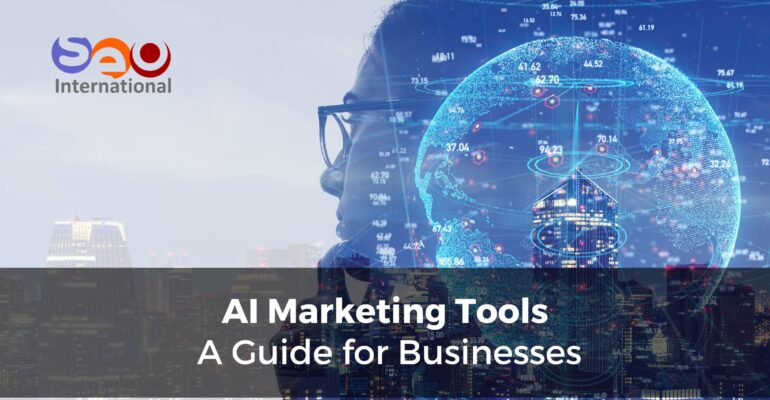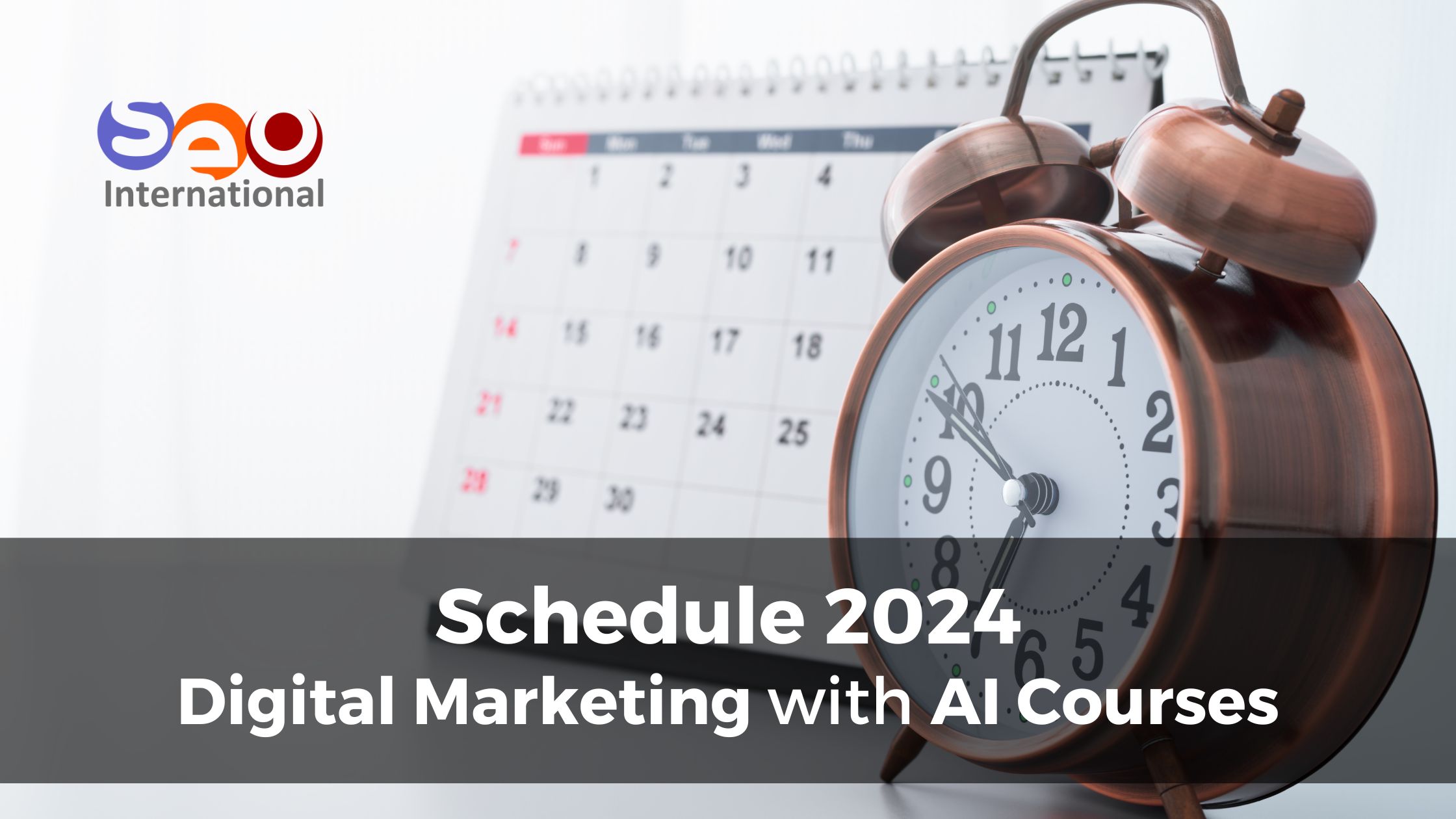Understanding AI Marketing Tools: A Guide for Businesses
December 25, 2023 2023-12-25 19:18Understanding AI Marketing Tools: A Guide for Businesses

Understanding AI Marketing Tools: A Guide for Businesses
In the realm of marketing, the integration of Artificial Intelligence (AI) has become a game-changer, revolutionizing how businesses interact with customers and analyze data. AI’s growth in marketing is not just a trend but a significant evolution, marking a shift towards more efficient, personalized, and data-driven strategies.
The influence of AI in marketing is substantial. It’s not merely about automating tasks; it’s about harnessing the power of advanced algorithms and machine learning to gain deeper insights into consumer behavior, enhance customer engagement, and optimize marketing campaigns. AI tools can analyze vast amounts of data at an unprecedented speed, providing marketers with actionable insights that were previously unattainable.
Importance of AI for Modern Marketers
One of the most telling indicators of AI’s impact on marketing is its rapid adoption and the resulting growth in the market. Recent statistics show that AI in marketing is experiencing robust growth, with a significant portion of businesses either already utilizing AI tools or planning to incorporate them soon. This surge is driven by the need to process large datasets, personalize marketing at scale, and improve the efficiency and effectiveness of marketing campaigns.
AI is transforming various aspects of marketing, from content creation to customer relationship management. In content marketing, AI tools are being used to generate engaging and relevant content, tailor-made for specific audiences. In customer relationship management, AI is enhancing customer interactions by providing personalized experiences, predicting customer needs, and automating responses.
As we delve further into the world of AI in marketing, it becomes clear that understanding and leveraging these tools is no longer optional but essential for businesses looking to stay competitive in a rapidly evolving digital landscape.
In this video, Neal Schaffer highlights the boundless potential of Artificial Intelligence (AI) in business, especially in marketing and content creation. It notes that while large companies are heavily investing in AI, it’s even more impactful for smaller businesses due to their aggressive adoption. AI tools are revolutionizing digital marketing by optimizing ad spend and analyzing influencer effectiveness. The conversation suggests that using AI is not just an option but a necessity for business growth, with tools like ChatGPT and Canva’s Magic Writer leading changes in content creation and editing.
The Evolution of AI in Marketing
The journey of AI in marketing is a fascinating tale of technological evolution and creative innovation. It began as a nascent concept, where the potential of AI in understanding customer behaviors and automating basic tasks was first recognized. Over the years, advancements in machine learning, natural language processing, and data analytics have propelled AI from a futuristic idea to a core component of marketing strategies.
This evolution is marked by several milestones. Initially, AI’s role was limited to simple data analysis and automated customer service responses. However, as technology advanced, AI began to play a more sophisticated role. It started powering personalized product recommendations, optimizing ad placements through predictive analytics, and even crafting content that resonates with specific audience segments.
AI’s growth in marketing
The growth of AI in marketing also mirrors the increasing availability of data. With the explosion of digital footprints, marketers now have access to a vast pool of consumer data. AI algorithms thrive on this data, using it to uncover patterns and insights that human analysis could easily miss. This ability to turn data into actionable insights quickly has made AI indispensable in contemporary marketing strategies.
The current state of AI in marketing showcases a blend of advanced predictive analytics, sophisticated customer segmentation, and real-time decision-making capabilities. This evolution is not just about technology; it’s about a fundamental shift in how marketers approach strategy, creativity, and customer engagement. The next sections will delve deeper into the practical applications of AI in modern marketing, showcasing how this evolution is shaping the future of the industry.
The Basic AI Concept
To truly harness the power of AI in marketing, it’s essential to understand its key concepts and technologies. AI in marketing revolves around three core elements: Artificial Intelligence itself, Machine Learning, and Data Analytics.
- Artificial Intelligence in marketing refers to the use of computer systems to perform tasks that typically require human intelligence. This includes understanding natural language, recognizing patterns in data, and making decisions. AI enables marketers to automate complex tasks, predict consumer behavior, and personalize marketing messages at scale.
- Machine Learning, a subset of AI, involves algorithms that learn from and make predictions or decisions based on data. In marketing, machine learning algorithms can analyze customer data to identify trends and preferences, optimizing marketing strategies for better engagement and conversion rates.
- Data Analytics in marketing involves analyzing raw data to find trends and answer questions. With AI-driven analytics, the process becomes more efficient and accurate, enabling marketers to make data-driven decisions quickly. This includes everything from understanding customer sentiments to predicting future market trends.
These technologies are not standalone tools but part of an integrated approach that is transforming marketing strategies. They enable marketers to create more targeted, effective campaigns, understand customer needs better, and ultimately drive more successful marketing outcomes.
The Impact AI has had on Marketing
The impact of AI on marketing is evident through compelling facts and figures. Data-driven insights showcase that businesses implementing AI in their marketing strategies are experiencing significant improvements in customer engagement, campaign performance, and ROI.
For instance, AI-driven personalization has led to an increase in sales, with some companies reporting up to a 35% rise in conversion rates. Moreover, AI-powered analytics tools have enabled marketers to reduce costs by optimizing their advertising spends, resulting in more efficient use of marketing budgets. Businesses using AI for email marketing have seen an increase in open rates by up to 14% and click-through rates by 59%. In customer segmentation, AI has improved accuracy by over 50%, leading to more effective targeting and reduced ad waste. AI-driven content creation tools have demonstrated a capacity to boost user engagement by up to 28%. These statistics not only highlight AI’s efficacy in enhancing various aspects of marketing but also underscore its growing indispensability in the industry.
In her video, Sharon Lee Thony, Founder and CEO of SLT Consulting, discusses the vital role of Artificial Intelligence (AI) in modern marketing. She emphasizes the need for marketers to stay abreast of AI advancements. AI is reshaping digital marketing by enabling personalized strategies and consumer segmentation, thus deepening consumer relationships and brand loyalty. Thony highlights AI’s application in content personalization, such as recommending products based on consumer behavior. She also touches on the transformative impact of chatbots and AI assistants on online interactions, citing examples like Duolingo’s GPT-4 for tailored language learning and Spotify’s individualized music recommendations. Moreover, Thony notes innovations like Sephora’s virtual artist, which are redefining customer experiences, and the evolving role of voice search in information retrieval.
AI Tools for Marketing
AI tools in marketing are like smart assistants, making complex tasks simpler. Some of these tools are great at writing articles or ads that sound just right. Others are like detectives, figuring out what customers want and helping businesses talk to them in a more personal way. Then some tools act like brainy analysts, sifting through heaps of data to spot trends that can guide future marketing moves. Imagine AI tools that cleverly decide where and when to show online ads, or make websites more noticeable on Google. This part of the article will discuss these tools in an easy-to-understand way, showing how they’re changing the game in marketing.
Content Generation
- ChatGPT by OpenAI: Ideal for generating ideas, creating blog post outlines, and social media post suggestions. ChatGPT’s natural language processing capabilities make it a valuable tool for crafting engaging and relevant text content.
- Jasper AI: Known for generating text content with a human-like quality, Jasper AI is effective for articles, social media content, and scripts, offering a nuanced understanding of different tones and styles.
- Dall-E by OpenAI: This tool specializes in creating highly realistic and creative images from textual descriptions. Dall-E is perfect for generating unique visuals for marketing campaigns, social media posts, or any digital content needing original imagery.
- Synthesia: An AI-driven platform that creates professional-looking videos from text inputs. Synthesia is useful for producing explainer videos, marketing materials, and social media content without the need for a full production team or video editing expertise. HeyGen is also a great alternative!
- Canva’s Magic Design: An AI-enhanced feature within Canva that assists in creating visually appealing designs and graphics. It’s particularly useful for creating consistent branding materials and social media graphics with minimal design experience.
These tools collectively cover a wide spectrum of marketing needs, from generating written content and creating compelling visuals to producing professional-quality videos, thus enhancing the overall content strategy and creation process in marketing.
AI in Customer Relationship Management
- Salesforce Einstein: Salesforce Einstein integrates artificial intelligence into the Salesforce CRM platform, enhancing various aspects of customer relationship management. It offers features like Einstein Discovery for identifying patterns and insights in data, Einstein Prediction Builder for custom AI model creation, and Einstein Bots for building and deploying custom bots connected to CRM data. Its capabilities include natural language processing, predictive analytics, and intelligent image recognition, all aimed at improving customer engagement, personalization, and efficiency in handling customer interactions.
- HubSpot’s AI Tools: HubSpot’s AI suite includes a range of tools designed to streamline marketing and sales processes. Key features include the AI Content Writer for drafting various types of content, AI Image Generator integrated with DALL-E for creating visuals, AI Website Builder for developing professional websites, AI Blog Generator with Semrush data for SEO-optimized content, and ChatSpot, an AI tool for simplifying CRM tasks using natural language. These tools collectively enhance content creation, website development, and overall CRM efficiency.
- Zoho CRM’s Zia: Zia is Zoho CRM’s AI assistant that provides actionable insights, predictive analytics, and task automation. It excels in analyzing email sentiments, suggesting optimal times to contact leads, and automating routine tasks. Zia’s capabilities enhance the efficiency and effectiveness of customer relationship management, offering a more personalized and data-driven approach to customer interactions.
- Microsoft Dynamics 365 AI: This tool focuses on utilizing customer data to provide in-depth insights and predictive analytics. Dynamics 365 AI is adept at understanding customer behavior and trends, which is crucial for tailoring customer interactions and improving engagement. Its features enable businesses to offer a more personalized customer experience, leveraging AI to analyze and predict customer needs.
- Freshworks’ Freddy AI: Freddy AI, offered by Freshworks, combines AI with CRM to deliver more personalized customer experiences and support. It includes AI-powered chatbots, predictive contact scoring, and intent detection. These features aid in better understanding and responding to customer needs, enhancing the customer journey, and providing businesses with an edge in their respective markets.
These AI-driven tools represent the forefront of technology in customer relationship management, offering functionalities ranging from predictive analytics and personalized interactions to automation and data-driven decision-making. They enable companies to improve customer engagement and gain a competitive advantage in the market.
AI Tools for Data Analysis Marketing Trends
- AutoGPT: This tool represents a significant leap in AI capabilities, allowing for autonomous actions like web searching and form filling. It’s particularly notable for its potential in tasks like market research and product comparison, although widespread adoption might still be a few years away. AutoGPT demonstrates the future possibilities of AI in analyzing market trends and customer behavior.
- Causal AI: Causal AI focuses on uncovering cause-and-effect relationships between marketing efforts and outcomes. It’s capable of answering complex what-if scenarios, helping marketers understand the incrementality of their marketing investments. This technology is relatively new but shows promise in enhancing decision-making in marketing strategy.
- FlowPoint: An AI-driven marketing automation tool, FlowPoint automates tasks such as email segmentation, lead scoring, and content personalization. By understanding user behavior, it crafts efficient marketing strategies, playing a critical role in comprehensive marketing strategies.
- Persado Motivation AI: This platform generates high-performing digital marketing messages. It personalizes messages using first-party customer data and refines language based on user response data. Persado’s messaging reportedly outperforms control copy 96% of the time, aiding in conversion rate optimization.
- Sailthru & Recombee: These AI-powered recommendation engines analyze customer behavior to provide personalized content and product recommendations. They are particularly useful in e-commerce and content platforms for enhancing user experience and driving engagement and sales.
These AI tools collectively enhance the ability of marketers to predict market trends, understand customer preferences, and make data-driven decisions, thereby increasing the ROI of marketing campaigns.
AI in SEO and Digital Ads
- Writesonic: Writesonic stands out as an AI-powered tool specializing in generating creative and effective digital content. Writesonic assists in creating compelling ad copy, blog posts, landing pages, and other marketing materials. It uses advanced AI algorithms to produce unique, engaging content tailored to specific marketing needs and objectives. This tool is especially beneficial for businesses looking to enhance their online presence with high-quality, SEO-optimized content.
- SEMRush: SEMRush is renowned for its comprehensive AI-driven SEO and competitive analysis tools. The platform provides actionable insights for website optimization and strategies to gain a competitive market edge. It covers a broad spectrum of SEO activities, including keyword research, site audits, and backlink analysis.
- Serpstat: This tool offers a range of features including keyword research, backlink analysis, and site audits. Serpstat’s AI algorithms empower users to make data-driven decisions by providing insights into competitors’ content strategies and highlighting areas for development on their websites.
- MarketMuse: MarketMuse is designed for managing SEO strategy and content intelligence. It evaluates relevance and authority across collections of pages, aiding in content planning, competitor analysis, content brief review, and optimization.
AI tools are essential in modern digital marketing, providing unparalleled capabilities in content creation, SEO optimization, and ad campaign management. By leveraging these tools, businesses can gain a significant competitive advantage, achieve better results, and efficiently navigate the ever-changing digital landscape.
The Future of AI in Marketing
As we look toward the future of marketing, the role of AI stands prominently at the forefront, marking a paradigm shift in how businesses connect with their audience. AI’s integration into marketing heralds a new era of precision and personalization, transcending traditional boundaries of customer engagement and data analysis. The sophisticated algorithms and machine learning models embedded in AI tools allow marketers to glean deeper insights from vast amounts of data, enabling them to tailor their strategies and content more effectively to individual consumer preferences.
The predictive capabilities of AI revolutionize market trend analysis, empowering businesses to anticipate customer needs and market shifts with remarkable accuracy. This foresight enables marketers to stay ahead of the curve, crafting strategies that resonate more profoundly with their target audience. Moreover, AI-driven automation in routine tasks such as email marketing, social media posts, and customer interactions streamlines operations, allowing marketers to focus on more strategic and creative aspects of their campaigns.
In this 10-minute TED Talks video, Jessica Apotheker from Boston Consulting Group discusses how Generative AI is becoming essential in organizational operations, particularly in marketing. She highlights the shift from traditional, creative marketing to a more AI-driven approach that offers personalized content but risks content saturation. Apotheker suggests a balance between developing AI skills and maintaining creative talent in marketing. She advises companies to collaborate beyond their usual networks for wider audience reach and to utilize a federated AI model for better market segmentation. She concludes that mastering AI and technological skills is crucial for the future of marketing professionals.
High Time you Embraced AI with Open Arms
In the digital age, where competition is intense and the pace of change is rapid, embracing AI becomes not just an option but a necessity for businesses seeking a competitive edge. AI’s potential to enhance customer experiences, optimize campaign performance, and drive innovation provides a significant advantage. Companies that leverage AI effectively can expect to see improved customer engagement, higher conversion rates, and more efficient marketing operations, ultimately leading to sustained business growth and success. Therefore, businesses should not only recognize the transformative impact of AI in marketing but also actively incorporate AI-driven strategies to remain relevant and competitive in the evolving digital landscape.
In conclusion, while AI continues to revolutionize the marketing landscape, staying ahead requires continuous learning and skill development. SEO International’s digital marketing courses in Dubai, also accessible globally online, cater to this need. Welcoming participants from across the Gulf region and beyond, these courses cover crucial topics like AI in marketing, SEO, and Google Ads. They’re designed to enhance your expertise and connect you with a diverse professional network. For those looking to elevate their marketing skills in this AI-driven era, explore these opportunities at SEO International’s marketing courses page: https://www.seointl.net/marketing-courses/



